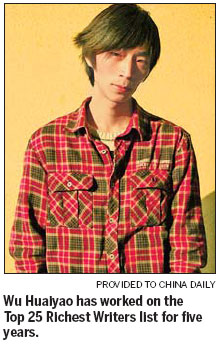Value not just in eye of beholder
By Mei Jia (China Daily)
Updated: 2010-11-26 09:24
 |
Large Medium Small |
The Top 25 Richest Chinese Writers list has been met with a lot of skepticism. Many have cast doubts on the precision of the figures and how they have been calculated.
Shanghai-based Wu Huaiyao, who likes to be known as "creator of the Richest Writers List", says he has been working on it for five years all on his own.
The 26-year-old released the first list in 2006, while working for a financial newspaper. Every year, Wu does a round of the major cities as well as field surveys, to collect firsthand data on how well the top 30 books sell.
"Since publishers are not willing to reveal the precise number of copies sold, I've had to resort to some rather primitive methods to get to the truth," Wu says.
For the 2010 list he spent three months talking with more than 300 book sellers, agents, authors and critics, to collect figures of book sales. Multiplying this with the royalty per book - which is usually between 8 and 14 percent of the retail price - he arrived at the income of the writers.

Though the 2010 "richest" writer Yang Hongying is not willing to comment on the accuracy of her listed 25 million yuan ($3.76 million), Wu is confident of his figures - which do not include earnings from speeches, TV/film adaptations and others.
Literary critic Zhang Yiwu from Peking University says while the list may not be very accurate with regard to the figures, it is precise in showing trends.
"The income and the rank may be wrong. But which other writer can claim his or her books have sold better than those listed?" Zhang says.
Culture critic Zhu Dake, based in Shanghai, praises Wu's courage in compiling the list but believes it should be done more scientifically.
"Wu can separate literature and quasi-literature for his next list to reduce doubts," Zhu says, "and turn his individual survey into a group effort, with input from university students pursuing a major in Chinese literature."
Zhu says initially the list was aimed at helping writers be more assertive of their independence in creating their works by pointing to their financial achievements, but now fears "writers may fall into marketing traps".
Both Chen Fumin and Bai Ye, from the Chinese Academy of Social Sciences, dismiss the list, saying it has nothing to do with writers.
"It belongs more to entertainment," Chen says.
While acknowledging that more attention should be paid to the state of writers and literature, Chen says "it is sad that the literature of our times is drawing eyeballs in such a way".
"Valuable literary works are never like dishes favored by all," Chen says.
Peking University's Zhang also thinks writers should not be too concerned about being on or off the list.
For those who have made it, it only means their works are now being valued in the market, he says.